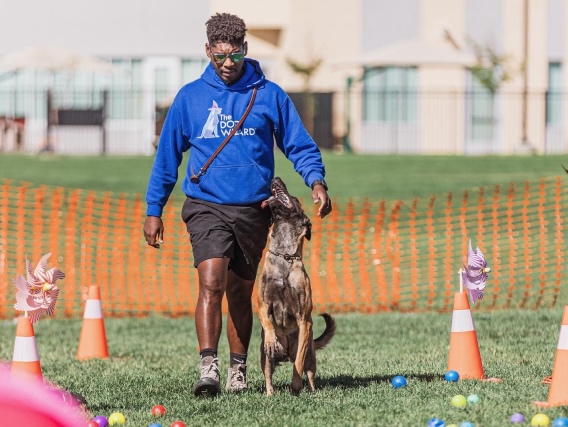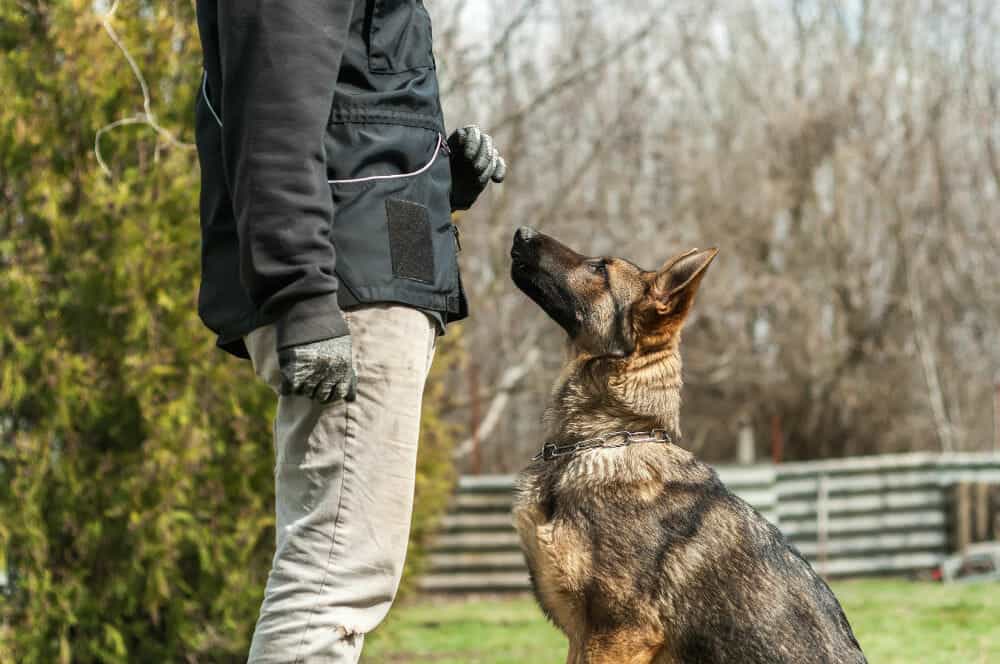Why Dog Training Near Me is Necessary for Your Canine Buddy
Why Dog Training Near Me is Necessary for Your Canine Buddy
Blog Article
Unlock Your Canine's Prospective: Proven Pet Training Approaches for Success
Effective dog training is a nuanced procedure that hinges on comprehending canine habits and employing scientifically backed methods. By integrating favorable support, developing clear commands, and focusing on socializing, canine proprietors can cultivate an effective partnership with their family pets.
Comprehending Dog Behavior
Comprehending pet behavior is important for effective training and cultivating a positive partnership between pets and their proprietors. A thorough understanding of canine body language, vocalizations, and social interactions is important for acknowledging their requirements and feelings. Pets interact mostly with non-verbal cues; as an example, a wagging tail may suggest excitement, while pinned ears can indicate fear or submission.

Moreover, ecological factors play a considerable duty in forming a dog's actions. Modifications in routine, brand-new environments, or the existence of unknown individuals can bring about tension or anxiety in pets. Acknowledging these triggers allows owners to reduce negative reactions and develop proper training strategies.
Inevitably, a deep understanding of pet habits lays the foundation for successful training methods, enhancing both actions and the total bond in between the canine and its proprietor. dog training charlotte nc. This understanding is essential for fostering a well-adjusted, pleased canine friend
Favorable Reinforcement Techniques
Reliable training relies heavily on positive support techniques, which have been revealed to yield substantial lead to shaping wanted behaviors in pet dogs. This technique involves awarding a dog for exhibiting particular actions, thus boosting the probability that these habits will be repeated. Benefits can take different forms, including treats, praise, playthings, or play, depending upon what inspires the individual canine.

It is necessary to slowly terminate rewards as the canine discovers the habits, transitioning to periodic support. This strategy preserves the actions in time while avoiding dependence on consistent benefits. By concentrating on positive reinforcement, trainers can cultivate a relying on connection with their pet dogs, advertising a healthy and participating training atmosphere that improves general obedience and performance.
Establishing Consistent Commands
An essential element of effective pet training is the facility of regular commands. Uniformity in commands is important for reliable communication between the trainer and the canine. When commands are consistent, pets learn to link particular words with preferred actions, which increases the training process and improves understanding.
To develop regular commands, it is important that all relative use the same terms and motions. For instance, if a single person makes use of "rest" while an additional states "take a seat," it can develop confusion for the dog. Select clear, distinct words for commands and make sure every person involved in the dog's training follows these choices.
Enhance commands through regular method, making sure that the dog obtains adequate chances to respond properly. When a canine successfully adheres to a command, immediate favorable support must comply with.
Lastly, hold your horses. Developing constant commands requires time and effort. With dedication and quality, you will certainly assist your canine create a strong understanding of assumptions, eventually leading to a mannerly buddy.
Socializing and Exposure
Mingling a dog is important for cultivating a well-adjusted and positive buddy. This process includes subjecting your pet to a range of settings, people, and other pets to create their social skills and flexibility. Early socializing, preferably in between the ages of three to fourteen weeks, is crucial, as it prepares for a pet's future habits.
During socializing, goal to give favorable experiences in various setups, such as parks, busy streets, and homes with other pet dogs. Introduce your pet dog to different stimuli, consisting of audios, sights, and scents, making certain that each experience is fulfilling. This direct exposure assists alleviate worry and stress and anxiety, leading the way for a much more durable pet.
Participating in regulated group play sessions with various other canines can also enhance social abilities, showing your family pet proper communications and borders. Always check your pet's convenience level during these experiences, progressively increasing exposure as their self-confidence expands. Keep in mind, the objective is to create a well-rounded pet that flourishes in varied circumstances, promoting an unified partnership with both human beings and various other pets. Focusing on socializing will dramatically add to your canine's total happiness and behavior throughout their life.
Conquering Common Educating Challenges

Pet dogs might battle to concentrate in unknown or busy settings. Gradually desensitize your dog to disturbances by starting training in a peaceful atmosphere and gradually introducing more stimuli as they go to this website become proficient.
Furthermore, behavioral issues like jumping or extreme barking can end up being aggravating. Address these by teaching alternate behaviors, such as resting smoothly when welcoming visitors. visite site Uniformity and persistence are critical; enhance desired behaviors regularly and avoid scolding, which can lead to complication.
Last but not least, recognize that each canine is unique, and training timelines may differ. Tailor your method to your canine's private needs, and look for specialist support if required. With willpower and the appropriate approaches, conquering these difficulties can result in a well-trained, happy canine companion.
Verdict
In verdict, opening a dog's possible necessitates an extensive approach that incorporates an understanding of canine actions, the application of positive support strategies, and the facility of constant commands. Early socializing and exposure to varied environments even more enhance a dog's adaptability and confidence. By attending to common training difficulties with customized strategies and perseverance, a unified and participating relationship between pet and handler can be cultivated, ultimately leading to a well-behaved companion with the ability of growing in numerous scenarios.
Reliable dog training is a nuanced process that hinges on understanding canine habits and utilizing scientifically backed methods.Recognizing canine behavior is vital for effective training and promoting a favorable relationship in between canines and their owners.Efficient training depends heavily on favorable reinforcement techniques, which Go Here have actually been revealed to yield significant outcomes in shaping preferred behaviors in canines. When commands are consistent, pets learn to link specific words with preferred actions, which speeds up the training procedure and boosts understanding.
In conclusion, unlocking a pet's possible requires a detailed method that incorporates an understanding of canine behavior, the application of favorable reinforcement methods, and the establishment of consistent commands.
Report this page